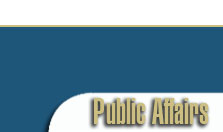

| Find: |
Advanced Search
|
 
|
|||||
| |||||
|
The Office of Legislative
|
| FOR IMMEDIATE RELEASE Feb. 28, 2007 |
Contact: Alvina McHale U.S. Department of the Treasury Financial Management Service (202) 874-6604 |
Washington, D.C. - Feb. 28, 2007 - Financial crime is a widespread concern among Americans, with four in 10 saying in a new Treasury Department-commissioned survey that they have been victims of identity theft or know someone who has. But the survey also reveals that people often leave themselves open to financial crimes - even in their own households - by using paper checks, rather than direct deposit.
The survey was sponsored by U.S. Department of the Treasury's Financial Management Service on behalf of its Go Direct campaign, which encourages people who receive Social Security and other federal benefits by paper check to protect themselves from financial crimes by switching to direct deposit. The release of the survey findings coincides with the recent passage of a U.S. Senate resolution declaring March 2007 "Go Direct Month" to raise awareness about the safety advantages of direct deposit, particularly for older and vulnerable Americans.
"Millions of Americans are affected by identity theft and other financial crimes, but there are steps people can take to increase their financial safety - such as choosing direct deposit," said Kenneth R. Papaj, Commissioner of Treasury's Financial Management Service. "Last year 57,000 checks issued by Treasury were fraudulently endorsed, while problems with direct deposit payments were negligible. In fact, while paper checks make up about 20 percent of the total Social Security and Supplemental Security Income payments, they account for more than 90 percent of reported payment problems."
Americans can easily sign up for direct deposit of their Social Security or other federal benefits for free by calling Go Direct at (800) 333-1795 or visiting www.GoDirect.org.
Financial crimes hit close to home
The survey revealed that nearly one in three respondents (31 percent) said they had had a check, important document or large sum of cash lost or stolen. Of this group, nearly one in five said a family member or member of the household had stolen the cash, check, or document. Furthermore, large numbers of Americans - 40 percent of survey respondents - expressed concern about having a paper check or other important document lost or stolen. Women are more likely to be worried about financial crimes, with nearly half the women polled saying it is likely they will have a paper check lost or stolen, compared to just over a third of men (46 percent vs. 35 percent).
"The National Crime Prevention Council and our partners in law enforcement appreciate the value of direct deposit in protecting older Americans from financial crimes," said NCPC President and CEO Alfonso E. Lenhardt. "NCPC has been a strong supporter of Go Direct since 2005 and is pleased to be aligned with the Treasury and the Federal Reserve Banks on this important initiative."
Misconceptions about direct deposit result in unnecessary risk
The poll showed that compared to Americans who use direct deposit for regular payments, those who use paper checks or other methods are significantly more likely to take unnecessary risks with their money. For example, they were twice as likely to carry around large amounts of money compared to people who use direct deposit (25 percent vs. 12 percent). In addition, 30 percent of those using checks and other methods say they are more likely to keep their money somewhere other than a bank account, compared to 22 percent of direct deposit users.
The Treasury-sponsored survey revealed that misconceptions about the safety and security of direct deposit are pervasive. Forty percent of respondents say paper checks are better than direct deposit at preventing theft or loss of payments such as wages or retirement benefits. And 20 percent say paper checks offer superior protection from identity theft or fraud. In fact, the opposite is true, with direct deposit providing substantial safety benefits over paper checks.
Go Direct aims to educate Americans on the many benefits of direct deposit
Go Direct Month and the Treasury-sponsored survey on financial security coincide with other activities including a yearlong "Countdown to Retirement" pledge drive to encourage baby boomers preparing to head into retirement to choose direct deposit once they start collecting Social Security benefits. Go Direct reaches out to people in a variety of ways, including through organizations they know and trust to inform them about the many benefits of direct deposit, and helps them sign up. The focus of the campaign is to encourage people to switch to direct deposit by educating them about the safety, security, and convenience benefits of direct deposit.
These results are of a nationally representative telephone survey of 1,003 adults, age 18 and over, conducted October 23-November 12, 2006, by KRC Research. The margin of error for the overall study is +/-- 3.1 percent at the 95 percent confidence level.